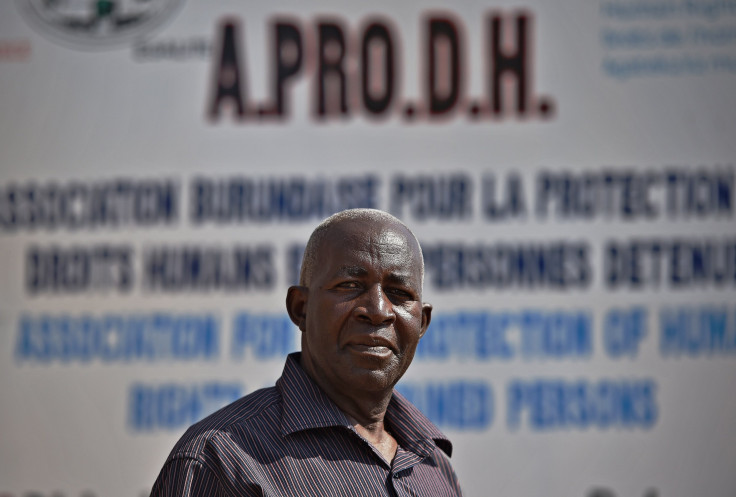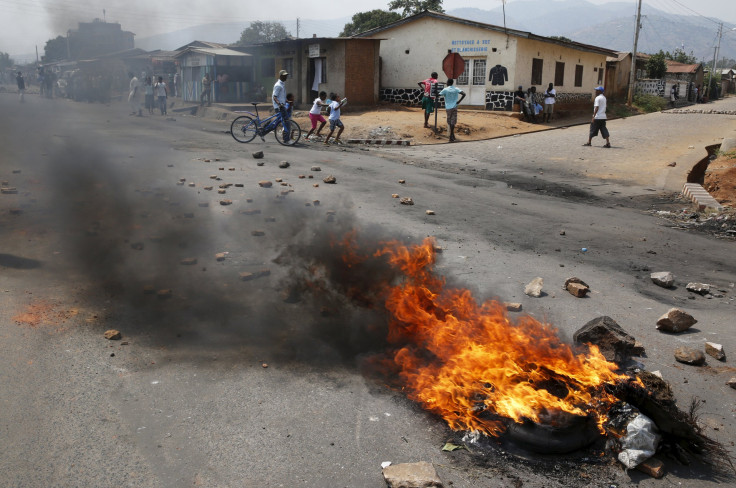Burundi Human Rights Activist Pierre Claver Mbonimpa's Son Killed In Bujumbura: Report

Updated 11:22 a.m. EST -- Leading Burundian human rights activist Pierre Claver Mbonimpa confirmed the death of his son, Welly Nzitonda, with Agence France-Presse. The young man's body was discovered Friday on the street of the capital Bujumbura, just hours after he was arrested, witnesses told the French news outlet. Nzitonda was apparently leaving the capital's Mutakura district along with dozens of other residents, after President Pierre Nkurunziza issued a five-day ultimatum to Burundians to lay down their weapons by Saturday night.
Mbonimpa's son-in-law was also killed in Bujumbura in early October. The activist, who is publicly opposed to Burundian President Pierre Nkurunziza's controversial re-election for a third term, is currently in exile in Europe.
Original story:
The son of prominent Burundian human rights activist Pierre Claver Mbonimpa was killed in the Mutakura neighborhood of Bujumbura, the country's capital city, according to Radio France Internationale. More than a dozen people have been killed since Saturday, in a wave of murders associated with Burundian President Pierre Nkurunziza’s recent re-election for a third term.
#Burundi : Pierre-Claver Mbonimpa dit avoir appris que son fils a été tué, son corps se trouverait sur la 12e avenue de Mutakura. @RFI
— Sonia Rolley (@soniarolley) November 6, 2015The U.S. ambassador to the United Nations expressed concern Thursday that the Burundian president’s five-day ultimatum for civilians to hand over illegal guns or be treated as enemies of the state may spark more bloodshed.
"The United States is alarmed by the escalating violence in Burundi and dangerous, irresponsible rhetoric on the part of the government, loyalist militias, violent anti-government forces and criminal elements," U.S. Ambassador Samantha Power said in a statement obtained by Reuters. "The United States expresses its extreme concern that the five-day ultimatum issued by the president will trigger widespread violence beginning this coming weekend.”
Nkurunziza on Monday set a Nov. 7 deadline for Burundians to voluntarily give up their firearms or risk being “dealt with as enemies of the nation,” after months of violent protests over his re-election in July and a failed coup d’etat. The president vowed that security forces would use any means necessary to search homes for weapons and opposition members once the deadline expires Friday. Power said Washington was “deeply concerned” by Nkurunziza’s remarks and that other Burundian officials have used “incendiary and divisive speech.”
France called for an urgent United Nations Security Council meeting on the crisis and expressed alarm of increased violence and sectarian statements in the East African country. The U.N. Security Council will convene Monday to discuss the situation
“France is extremely concerned by the worsening situation in Burundi, which is typified by the multiplication of violence acts and violations of human rights,” French Foreign Ministry spokesman Romain Nadal said in a daily briefing Friday, according to Reuters. “France condemns the hate speeches, including those of an unacceptable sectarian connotation.”

Nkurunziza’s landslide victory in the June presidential polls fueled fresh protests and attacks in war-torn Bujumbura. Dozens have been killed since the elections, including Burundian opposition figures and supporters, as well as a former army chief and a former intelligence chief. Mbonimpa, president of the Association for the Protection of Human Rights and Detainees, was shot and seriously wounded in August by gunmen on motorbikes in the capital city. Despite the attacks, Nkurunziza was sworn in during a low-key inauguration in August.
More than 200,000 people have been displaced by the political crisis that began in April when the ruling National Council for the Defense of Democracy-Forces announced Nkurunziza, a former Hutu rebel, would run for a third term as president. Critics said Nkurunziza was violating the constitution and a peace deal that ended 12 years of civil war between Burundi’s Hutu majority and Tutsi minority tribes.
Hundreds of thousands of refugees have sought asylum in neighboring Rwanda, Tanzania and the Democratic Republic of Congo. Rumors have swirled that exiled Burundians have formed an armed opposition movement in Rwanda and are planning cross-border attacks on the ruling party.
© Copyright IBTimes 2024. All rights reserved.











